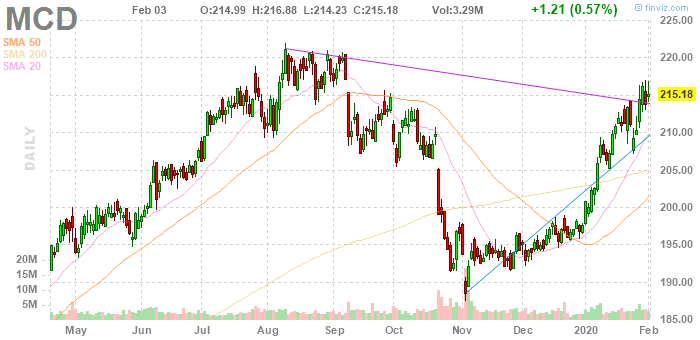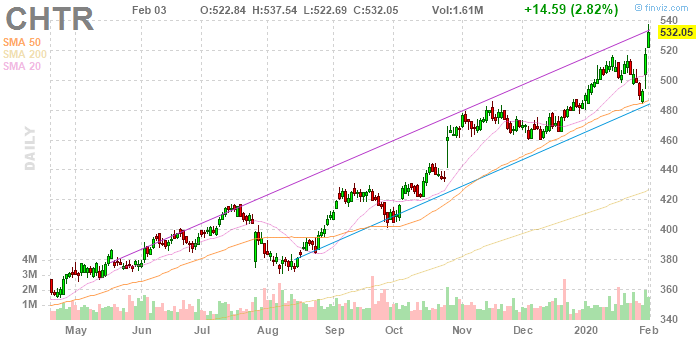In recent years, investor worries about valuation usually have focused on high-multiple, high-growth stocks. Shopify (NYSE:SHOP) and Roku (NASDAQ:ROKU) are two of the better examples. Both stocks trade at seemingly obscene multiples relative to revenue, let alone profits. But both stocks have soared: ROKU gained 355% in 2019, and SHOP 187%.
Even among stocks that haven’t performed as well — or even well — investors have pointed to potential bubbles. 2019 initial public offerings like Uber (NYSE:UBER), Lyft (NASDAQ:LYFT), and Peloton Interactive (NASDAQ:PTON) brought a wave of unprofitable companies to the market. Many of last year’s IPOs have declined from their opening prices and remain dogged by claims of overvaluation.
But valuation worries aren’t just the province of high-growth tech plays. During this bull market, older, quality stocks have seen their valuations creep ever higher. It was not that long ago that low-growth companies struggled to receive even a 20x price-to-earnings multiple. With U.S. stocks as a whole near all-time highs, and the S&P 500 up nearly 400% from 2009 lows, multiples close to 25x are not uncommon.
Can that multiple expansion continue for even the market’s highest-quality companies? It’s a key question for U.S. stocks. Tuesday’s big stock charts focus on three names for which that question is paramount. All three companies unquestionably are among the best on U.S. markets. But the question, from both near-term and long-term perspectives, is to what extent their stocks already price in that quality.
McDonald’s (MCD)
When we covered McDonald’s (NYSE:MCD) in our big stock charts in early November, MCD stock was in freefall. At the time, the chart strongly suggested shares would keep falling. But the stock found a bottom, and has rallied nicely in the new year, already gaining 8.9%.
Just shy of all-time highs, the first of Tuesday’s big stock charts does suggest there should be more upside ahead. But valuation is a worry, and it’s possible a top could emerge as suddenly as the November bottom did:
- At the very least, MCD stock seems set to reach new all-time highs above $220. Gains in recent sessions led the stock to exit a wedge pattern, which suggests momentum to the upside. There’s a nice cup-and-handle pattern, though some of that rally already has played out. A “golden cross” looms as well, with the 50-day moving average likely to cross over the 200-day moving average in the next few sessions. Given solid, if unspectacular, volume, that indicator supports a bullish outlook as well.
- Fundamentally, the case gets a bit dicier. It was only a few years ago that McDonald’s stock traded at a high-teen multiple to forward earnings. The figure now is over 23x. A dividend yield consistently over 3% has shrunk to 2.3%. The launch of all-day breakfast and a “refranchising” effort under former chief executive officer Steve Easterbrook drove much of the rally over the past five years. Those catalysts, however, have played out.
- MCD stock seems like a perfect example of the valuation questions at play among quality large-cap stocks. This unquestionably is a great American company. But there’s likely little left in the way of turnaround benefits. Earnings per share growth is slowing into the single digits, and analysts on average see less than 7% upside over the next twelve months. Is that package enough for investors to keep piling into the stock, given its defensive qualities? Or does the price begin to matter as McDonald’s stock looks to set new record highs?
Charter Communications (CHTR)
For cable provider Charter Communications (NASDAQ:CHTR), in this market there’s only one question: what stops the rally? The second of our big stock charts doesn’t have an answer:
- Technically, CHTR stock remains in a textbook uptrend. A brief fade in recent sessions reversed quickly thanks to a fourth quarter earnings beat last week, and shares jumped again on Monday. The 50-day moving average continues to provide support. At some point this rally ends (presumably), but the chart doesn’t suggest that point is arriving any time soon.
- But fundamentally, the core question is: how much longer can this really go? CHTR now trades at a whopping 27x forward earnings. That’s a multiple more than double that of rival Comcast (NASDAQ:CMCSA). There are reasons for the gap — Charter has an opportunity to take customers from struggling telecom rivals, for instance — but even in that context the difference in valuation is stunning. Charter’s history is impressive, but it too is dealing with declines in video and voice subscribers.
- Like McDonald’s, Charter needs investors to keep paying premium multiples (or higher) for premium companies. But the stock highlights just how far those multiples have gone. Shares have more than doubled since December 2018; companies with a market capitalization over $50 billion (as Charter did at those lows) very rarely do see those kinds of gains in such a short period of time. The valuation gap between the two cable stocks is stunning.
- To some investors, that valuation is problematic. To others, the chart tells the story. As has been the case so often in this bull market, it’s been the latter group that’s capitalized on the biggest returns.
Sherwin-Williams (SHW)
Somewhat quietly, Sherwin-Williams (NYSE:SHW) has been one of the best stocks of the past decade. Shares have risen nearly 800% over the last ten years, and have doubled in a little over three.
But the third of our big stock charts suggests caution, due in part to one key characteristic that differentiates SHW from other expensive, high-quality names:
- Technically, this looks like a reversal waiting to happen. Shares have traded sideways for some four months now, with a double top just below $600 a source of real concern. SHW stock averted disaster in recent sessions and bounced back with a 3%-plus gain on Monday, but the chart still has a negative bias after a fourth quarter earnings miss on Thursday.
- Valuation here doesn’t look quite as stretched, though SHW still gets a hefty 24x multiple to 2020 consensus EPS estimates. But it’s important to remember that Sherwin-Williams, unlike McDonald’s or Charter, isn’t a defensive business. The core paint business has a strong cyclical component. That valuation is reminiscent of that assigned Home Depot (NYSE:HD), which too looked like a cyclical play valued as a defensive one. HD stock wound up falling sharply in November, though it has since recovered most of those losses.
- And so SHW stock at the moment seems to have quite a bit of risk. The chart is worrisome. So is valuation. And with fourth quarter earnings in the rearview mirror, there isn’t a catalyst on the way. For SHW to hold support and avoid a reversal, the broad market is going to have to cooperate.
As of this writing, Vince Martin has no positions in any securities mentioned.



